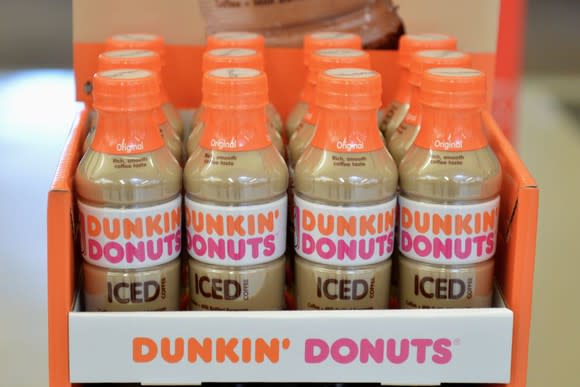Dunkin' Brands CEO David Hoffmann Talks Expansion, Franchisee Returns, and More
Dunkin' Brands Group's (NASDAQ: DNKN) new CEO David Hoffmann shared some key aspects of his competitive strategy during the company's second-quarter earnings call last month. Here are the major takeaways for long-term investors.
Dunkin' Donuts' menu simplification is progressing well
Q2 was the first full quarter that the simplified menu was in the entire U.S. system, and I am proud to share that the simplification has been a huge success. Streamlining our menu and removing some of the more complex lower velocity products was a direct investment in creating a better environment for the people who work hard to serve our guests in a fast and friendly manner. We are pleased to hear positive feedback from crew regarding working in our stores and continue to focus on improving the restaurant experience for both guests and crew members.
-- CEO David Hoffmann
Dunkin' Donuts' new streamlined menu negatively impacted same-store sales by about 1% in the second quarter. This was to be expected, as removing menu items tends to temporarily dent sales until customers adjust their ordering habits.
On the positive side, franchisees saw their cost of goods sold fall by approximately 1%. They also enjoyed slightly reduced labor costs, despite the pressure of rising minimum wage rates. Moreover, the company is seeing faster service times and order accuracy, which should improve customer satisfaction.
Better still, Dunkin's new streamlined restaurant operations make it easier to add new products, such as limited-time offerings and special value deals. In this regard, the company found success with its new Go2 value deal, which helped to boost sales of breakfast sandwiches during the quarter.
Hoffmann said the negative sales impact of menu simplification should "dissipate over the next two quarters," while the positive effects should continue over the long term.

Image source: Dunkin' Brands Group.
Strong growth in packaged goods
Convenience is also about being wherever our guests want to use us, including outside the four walls of our restaurants with Dunkin' branded products. Through mid-June, our total portfolio of CPG products across both brands delivered more than $400 million in retail sales this year, including over $70 million in ready-to-drink bottled iced coffee.
-- Hoffmann
While Dunkin' Donuts is streamlining its in-store menu, the company is expanding the number of items it sells in grocery stores and other retail locations. As my colleague Asit Sharma wrote, Dunkin' Brands has partnered with the likes of J.M. Smucker, Keurig Dr Pepper, and Coca-Cola to help it sell more packaged coffee, K-Cup pods, and ready-to-drink coffees.
Hoffmann noted that Dunkin' Donuts K-Cups are rapidly gaining share, with growth of more than 20% in the second quarter. Moreover, sales of Dunkin's packaged goods help to strengthen the brand's ties with existing customers, while also exposing its products to new potential customers who might not yet frequent its restaurants. As such, consumer packaged goods represent an exciting long-term growth opportunity for Dunkin' Brands.
Franchisees are enjoying solid returns
Looking at the 2017 cohort of new restaurants opened in our top 10 development markets, we expect cash-on-cash returns to be in line with the 2016 cohort or in the 20% to 25% range. As a reminder, these top 10 markets are all located outside of our core.
-- Hoffmann
Much of the allure of Dunkin' Brands' stock for investors resides in the company's long-term expansion strategy, which calls for it to nearly double the number of its U.S. Dunkin' Donuts restaurants to approximately 18,000. But for these plans to come to fruition, Dunkin' must continue to be an attractive investment opportunity for franchisees.
As a 100% franchised business, it's vital for Dunkin' to help franchisees generate strong cash-on-cash returns, which is essentially the cash flow franchisees earn on their total cash investment. If Dunkin' can continue to deliver returns in the range of 20% to 25%, there will likely be strong demand among both existing and new franchisees to open new restaurants. This, in turn, will make it more likely that Dunkin' Brands can fulfill its long-term expansion potential and deliver on its growth promises to investors.
More From The Motley Fool
Joe Tenebruso has no position in any of the stocks mentioned. The Motley Fool recommends Dunkin' Brands Group. The Motley Fool has a disclosure policy.
